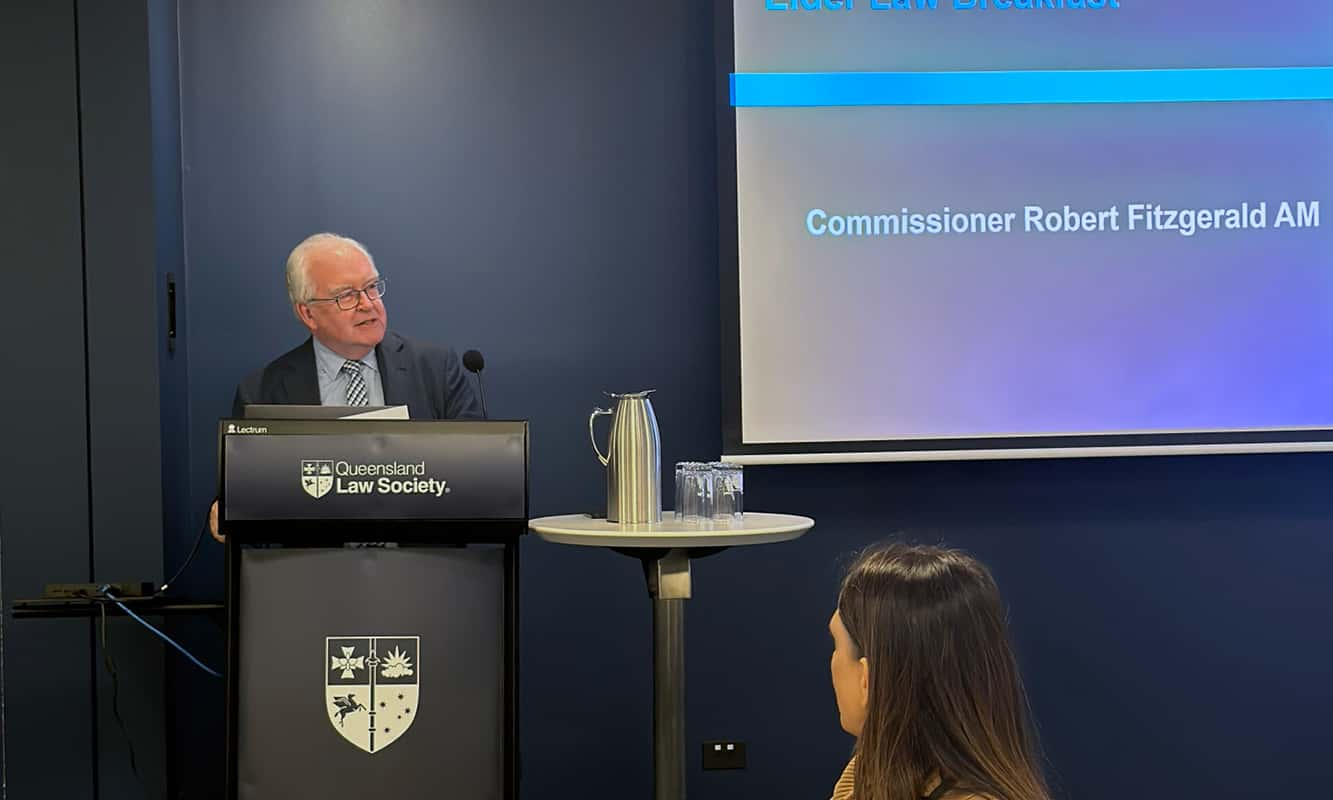Do we need a specific criminal penalty which deals with the abuse of older people?
This was one of many thought-provoking questions posed by Age Discrimination Commissioner Robert Fitzgerald at the Queensland Law Society World Elder Abuse Awareness Breakfast in Brisbane on Friday.
The breakfast panel featured a range of presenters.
“Have we got a situation where there are laws that are adequate to deal with the abuse we see, or do we need laws that are specific to older people?” he asked the audience during his keynote address at Law Society House.
Commissioner Fitzgerald pointed to examples of child protection, where a range of laws dealt with children, and domestic and family violence, of which elder abuse could be part.
“Should we have any form of mandatory reporting of elder abuse?” he then asked.
“We do have mandatory reporting of abuse by staff and volunteers that occurs in all of our service systems, including the aged care system, and of course in the NDIS systems for people with disabilities.
“The question is, should there be any aspect of elder abuse that requires mandatory reporting?”
Commissioner Fitzgerald spoke of his duty to make referrals to police in his former role as NSW Ageing and Disability Commissioner
“The good news is the police right throughout Australia have become much more active to following up and investigating matters,” he said.
“It follows the same pattern as child abuse, child abuse in institutions and domestic and family violence where the police treated these as purely domestic matters.
“They instantaneously acted in an ageist way to believe that the person affected, the older person, would be incapable to be a solid witness, and acted accordingly, which was to do very little – that has changed.
“The second thing that has changed is that we have more courageous public prosecutors around Australia, thank God, who are prepared to go a little bit further in terms of prosecuting some but very few of these matters.”
He said change for elder law was yet to be seen in the court, however.
“We know through child protection, we know through sexual abuse in institutions, we know in domestic and family violence, that it is the very last part of the equation that will move,” he said.
“As a consequence of that, most of the matters that are being brought before the courts are in fact failing – people are being acquitted. There are significant reasons why that might be occurring, partly it is because the key witness, by the time the prosecutions are being brought have probably lost some cognition, if not full.”
A workshop followed the breakfast.
Commissioner Fitzgerald said another significant reason was that elder abuse was often perpetrated by adult children.
“There is a bias in our society that does not want to believe that sons and daughters actually abuse their parents and relatives,” he said
“Then there is that the accused are able to run the most extraordinary emotional campaigns possible – ‘we’re the only ones that care for Mum’, ‘we didn’t know what we were doing; we were trying out best’,’ she actually gave us the money’’, ’she didn’t want us to attend the health services’ – all of that happens.
“What I know from long experience is that that will change and we will start to see a small increase in the level of convictions.”
Other issues raised included the potential for elder abuse within Voluntary Assisted Dying legislation, the “desperate need to overhaul EPOAs across the country”, and the prevalence of elder abuse in retirement villages.
“Should it be that coercive conduct or coercive control legislation refer to domestic relationships rather than simply intimate relationships?” the Commissioner also asked.
“In some states and territories it applies to intimate partnerships only, yet most of the work in elder abuse is by family members abusing other family members,” he said.
Commissioner Fitzgerald then asked what regime Queensland should have to include elder people in decision-making.
“If we can introduce a range of supports for decision-making, we extend the capacity older people to be engaged in decisions that affect them for much longer,” he said.
“One of the biggest challenges we have, particularly with culturally diverse communities, is when people get a diagnosis of dementia.
“Their family members immediately believe their relative is now incapable for making decisions, and that is simply not true. It may take 10 or 12 or 15 years before a person loses complete capacity.
“But what’s happening is not only their relative, but then institutions such as aged care facilities and others, are making that assumption.
‘Ageism underpinned responses to elder abuse.’
“An absurd thing that’s now happening around Australia where age care providers are requiring residents, before they enter, to have guardianship arrangements in place and in and of itself, that doesn’t mean you lose the capacity to make decisions, but in fact that’s exactly what’s happening.”
Commissioner Fitzgerald then concluded by saying ageism underpinned responses to elder abuse.
“If we are going to make a difference, we not only have to address the issues that I’ve just referred to… but we actually have to change the way in which we as a society see older people.
“And the law is no different to that – the way in which we see older workers in our environment, the way in which we deal with older members of our professions, the way in which we deal with older clients – you’re at the centre point of this.”
A two-part workshop covering controversies, hot topics, practical advice and best practice principles when working with older people, followed the breakfast.

















Share this article